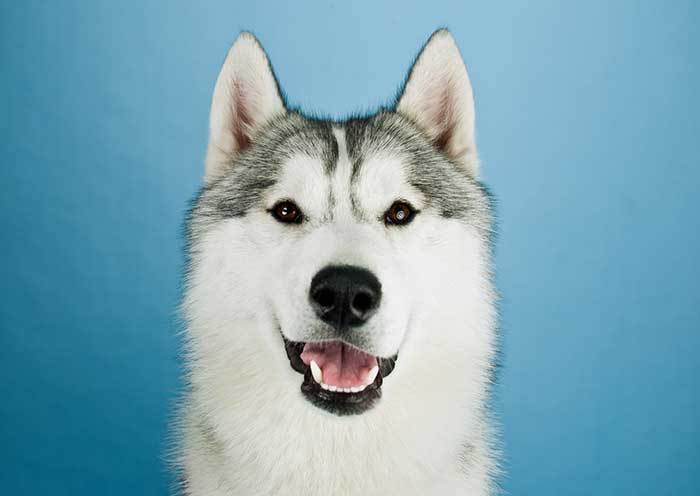Siberian Huskies are among the most beautiful dogs in the world due to their thick wolf-like coats and piercing blue eyes.
These medium-sized dogs are also among the most vocal breeds around. They enjoy living life on their own terms, and often use their characteristic wailing howl to ensure their thoughts aren’t ignored.
Huskies use howling as a means of communication because of their wolf ancestors.
Huskies actually are known to howl more than many other domesticated dog breeds. While they no longer need to ‘talk’ or howl to communicate through forest and snow, domesticated Huskies are still talkative.
In this article, we’ll take a closer look at why huskies are so vocal, and what you can do to stop the howling!
We already know that howling can be a source of annoyance and frustration, and failure to address it properly may encourage bad behavior in the future.
So why is your Husky so vocal and what can you do about it?
Let’s take a closer look to learn more about how Siberian Huskies talk to their owners.
Table of Contents
Why Are Huskies So Vocal Compared to Other Breeds of Dogs?
So, why are Huskies so vocal? Firstly, it is a form of communication. For pack animals like dogs, whining and howling are the main means of communication. Moreover, they make their feelings and needs known by talking.
Due to their heritage, Siberian Huskies tend to bark less than most other breeds.
Siberians do rarely bark as a way of keeping a claim on their territory. Barking is normally a territorial behavior and Huskies are not particularly territorial in nature. More frequent barks are used to invite play.
Reasons Why Siberian Huskies Are So Vocal
All dogs (including Siberians) are descendants of wolves and are quite similar genetically.
In fact, wolves and Huskies share a lot in common. Although they look like wolves, Siberians are not more wolf than other dog breeds.
Huskies have been able to maintain their wolf-like appearance due to their breeding and environment.
Like wolves, however, Huskies have an instinctual need to howl or make other sounds. So let’s find out why they talk or howl.
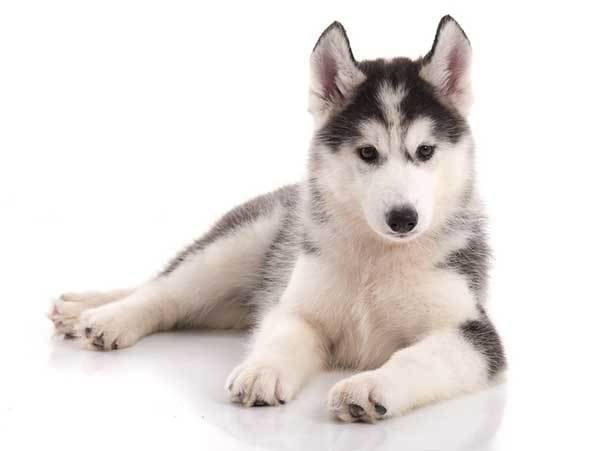
1. Vocal Communication
Siberian Huskies howl frequently and might even use howling to talk, producing strange and funny sounds as they express excitement, curiosity, annoyance and even emotions that seem completely foreign to us.
Apart from howls, other Husky sounds include whines, moans, chirps and whimpers.
The reason they make these sounds depends on the circumstances. The main reason is to pass some information along.
However, regardless of what people think, dogs most likely do not understand what we say. Although they sometimes seem to answer or use some words at the right time, they are just trying to copy us.
Like other dogs, Siberian Huskies use their voices to convey different messages.
If your Husky howls at you, he most likely sees you as his family member. Such howls sometimes sound like human voices.
As we’ve already mentioned, Huskies are among various breeds of domesticated dogs that display traits like howling instead of barking. Due to their tendency to live as pack animals, they are used to enjoying the company of other dogs and do not tolerate being left alone for far too long.
? If you’ve recently added a Siberian Husky to your family, then howling is probably a sign of comfort since they are in an environment they are yet not used to.
Generally speaking, most Huskies should start to feel more comfortable after a few days. However, if you think your puppy is not adjusting to his new environment, consult with a professional behaviorist or positive trainer to prevent the situation from getting worse.
In most cases, however, provided you give your puppy a comfortable place to relax, time to adjust and lots of love and attention, he should get used to his new environment within a short period of time.
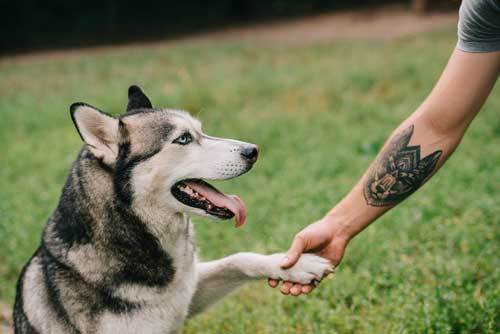
2. Separation Anxiety
Separation anxiety is a major cause of excessive vocalization.
If this is the case, your pup will normally display other signs of stress including house-soiling and destructive chewing habits. Leaving your Husky with interactive dog toys can help reduce “normal” separation anxiety.
However, training a Husky out of separation anxiety is sometimes a long process that might require the assistance of a professional dog trainer depending on its severity.
3. Attention-Seeking
Another common cause of excessive howling and whining is attention-seeking.
Chances are you’ve taught your dog that howling is cute without realizing it. Your Husky might have thought that howling is a great way to let you know they need to be fed or taken out for a walk.
Fortunately, these habits are easy to teach your pup out of. With consistency and self-discipline, you can train your dog to reduce his howling and learn to pass his message in other nonverbal ways.
Pay attention to your Husky when he is quiet. Reward your dog with a random treat, toy, play or praise when he is quiet. Once he starts making noise, make sure to ignore him completely.
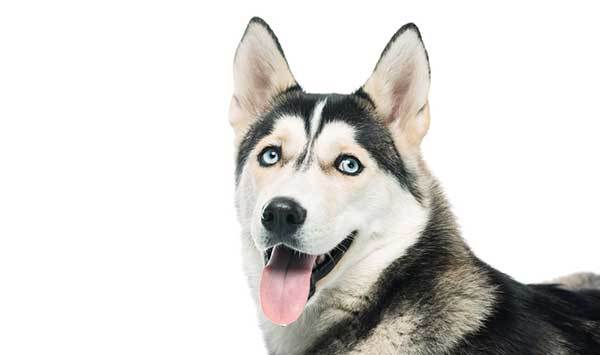
When they are making noise, be sure to deny them whatever they are asking for. If they want a toy or food, don’t give it to them until they stop making noise and remain quiet for at least 5 minutes.
After around 5 minutes of total silence, praise him and give him a treat, along with what he was demanding. Do this for 5 to 10 minutes several more times per day, increasing the amount of time as your dog gets older.
ALSO READ: Miniature Husky – Is This Mini Husky The Perfect Choice For You?
4. Sensitive Hearing
Much of the research has shown that Huskies howl when they perceive certain sounds.
Dogs can hear and react to noises that we can’t hear. They can hear between 40 and 60,000 Hz while humans can only hear 20 Hz to 20,000 Hz. This implies that dogs generally hear higher-pitched sounds than us, humans.
As such, a dog can react to a dog barking 50-100 feet away by howling or imitating other sounds like ambulance, fire-engine or police sirens. So, don’t be surprised if your Husky suddenly starts howling.
Siberians are also known for singing along to music or with their loved ones when they sing. Some animal behavioral specialists believe that this is simply a way of howling to find other pack members. Others think that certain dogs are capable of sensing tones and following melodies.
If a Husky realizes that it gets attention for howling, it will most likely do it again.
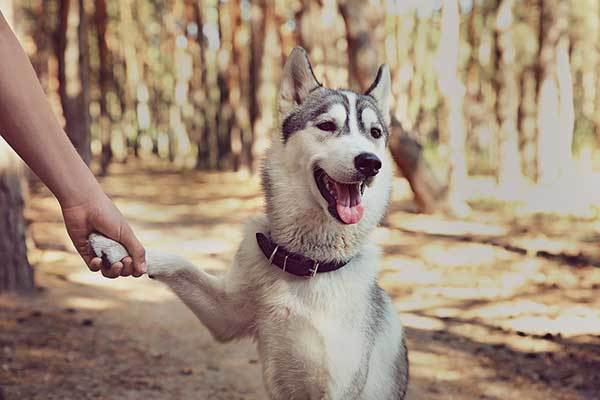
How To Deal With Vocal Huskies
Howling is just one means of communication Siberian Huskies tend to use. Some of these dogs use howling as their primary means, while others use barking, whining or talking.
Although it’s common for Siberian Huskies to use a combination of all these forms of communication, some Huskies tend to howl in almost every situation.
While some Huskies are quiet and talk or howl on occasion, others are very vocal. If your dog howls excessively, there are many ways to deal with the problem.
1. Change Your Dog’s Routine
The first thing you should do is to figure out the context of the vocalization. Does your Husky howl at certain times only, or does he do it throughout the day?
Making some adjustments to your dog’s daily routine can help stop the howling behavior.
If your dog howls continuously throughout the day or night, make sure to try and eradicate any potential concerns. For instance, Huskies tend to howl when they are under exercised or bored.
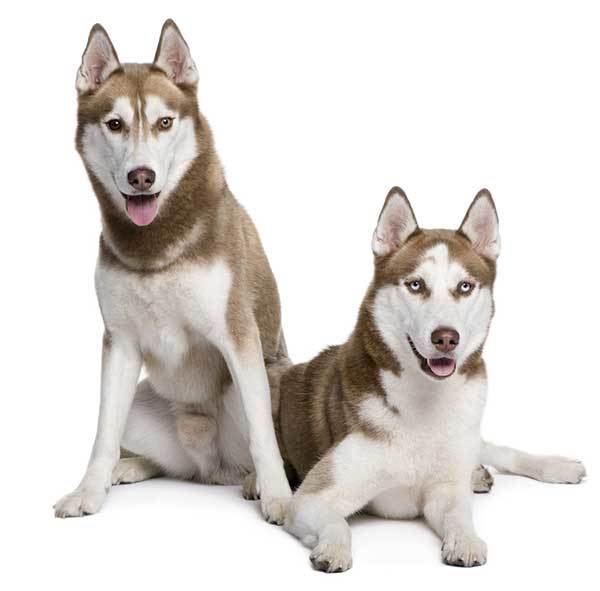
Even if you think your Husky is getting an adequate amount of exercise, make sure to increase the amount of time you allocate to each session to see if their behavior improves.
Adjust the schedule and do things a bit differently this time. This will help you determine if the howling is due to a change in environment.
If the howling reduces or stops altogether, you will know that the issue is the dog’s routine or activity levels.
If changing his routine and giving him a good exercise doesn’t stop the howling, then you can rule out that as the cause.
LEARN ABOUT IT: How To Train A Stubborn Dog (12 Easy Tips)
2. Train Your Dog To Howl On Command
The most common method dog owners use is to try and get their Husky quiet on command. However, this doesn’t always produce the desired results.
Instead of teaching your dog a command to stop howling, the best approach is to train him to howl on command. When properly executed, it works like magic.
You should first train your dog to howl on command. Once your Husky learns to howl on command, you can add a different command to stop howling and be quiet.
with consistent and relevant training, your Husky will stop howling unless you give him the appropriate command.
Teaching your Husky to bark or howl on command and then stop barking or howling on command is an effective way to get your Siberian Husky to stop howling.
Conclusion
Most Siberian Huskies howl – it’s in their blood! However, with some work and training, you can help your Husky to howl or cry at the right time or stop them from howling constantly at home.
Just keep your Husky active, find them plenty of toys to play with and give them a lot of love and attention.
When your Husky is happy and satisfied, he will be less likely to howl for no reason at all, and more likely to be a delight for you and your family.
So understanding what triggers howling and knowing how to manage it properly can make owning a Husky a pleasant experience for everyone.

